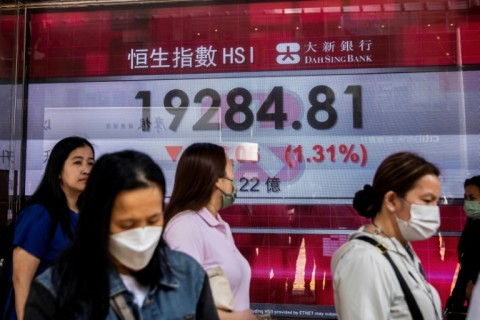
BEIJING - Asian stocks were down on Wednesday following losses on Wall Street fuelled by fears of banking sector turmoil and jitters over interest rates.
Sydney was more than one percent down in morning trade after the Australian central bank hiked interest rates there to an 11-year high -- a surprise move that dashed hopes it would hold rates steady as inflation showed signs of slowing.
Investors were also positioning themselves ahead of an expected US Federal Reserve rate hike on Wednesday, and one from the European Central Bank on Thursday.
Meanwhile, US regional bank stocks logged another day of plummeting values on revived fears for the sector spurred by the failure of yet another lender -- First Republic Bank -- and its takeover by JPMorgan Chase.
Investors appeared to be "quickly hitting the sell button as banking turmoil appears it is not going away anytime soon", Oanda's Edward Moya said in a note.
"Risk appetite did not stand a chance as traders focused on lingering doubts over the regional banks, rising recession odds, and growing risks that the US could default on its debt next month."
Hong Kong was down nearly 1.5 percent in early trade, with tech shares among the biggest losers.
Seoul, Taipei, Wellington, Jakarta, Singapore, Kuala Lumpur and Manila were all down on Wednesday.
Markets in Japan and mainland China were closed for holidays.
US futures, meanwhile, were flat or inching up following the previous day's hefty losses.
In a note, Stephen Innes of SPI Asset Management said the "economy is slowing down", pointing to an overall "weaker macro milieu" along with fleeing bank deposits and falling oil prices.
"You do not need a PhD in economics to see that a soft landing at this point would need a string of unbelievable luck," he added.
Oil prices were still down Wednesday after tumbling the day before, with the main international contract, Brent North Sea, under $76 per barrel.
The recent drop has erased gains seen after multiple members of the OPEC+ exporters' alliance unexpectedly slashed production at the beginning of April.
"Downward price pressure could persist in oil markets until it becomes clear that a significant recession will be avoided and growth in global oil demand won't be stunted," Innes said.

